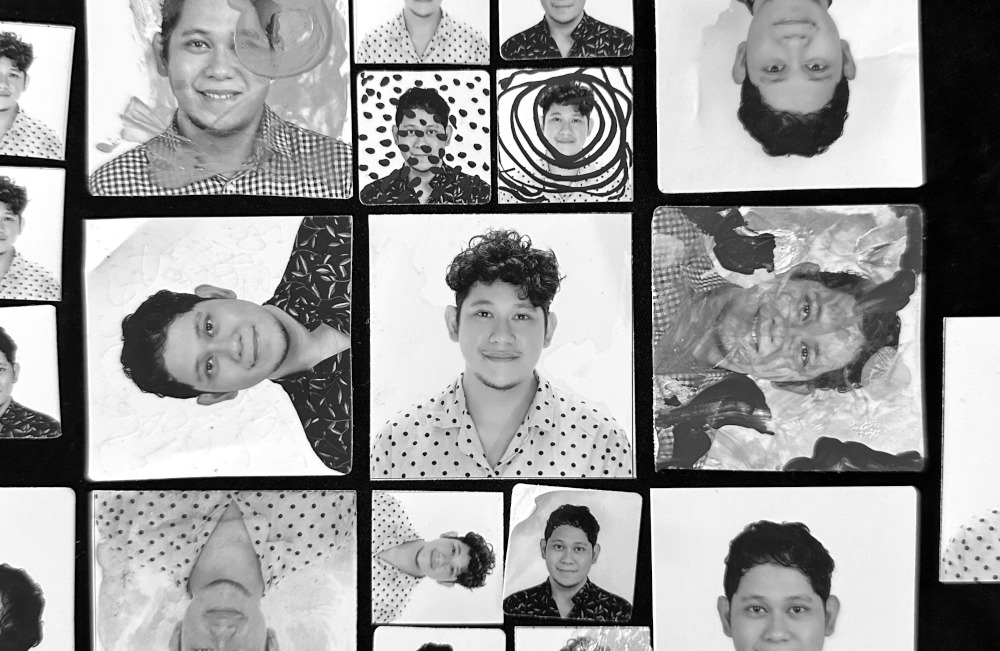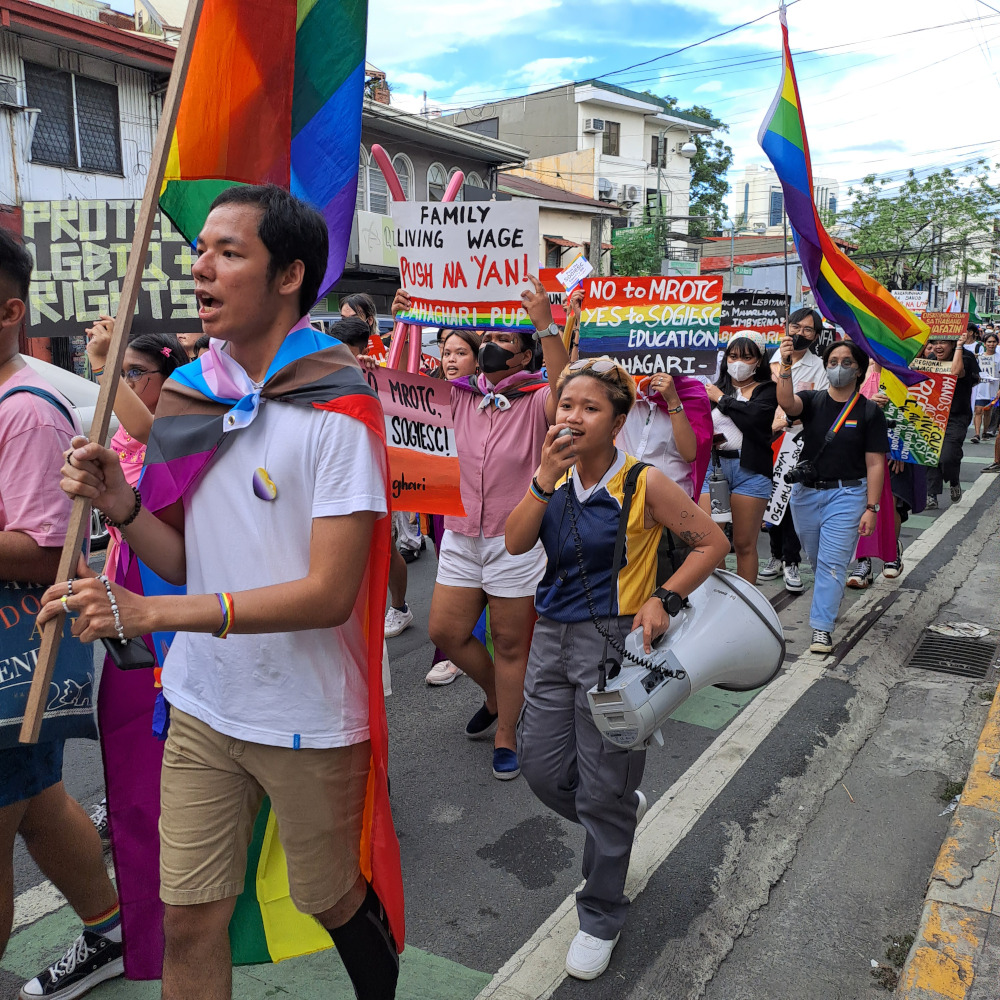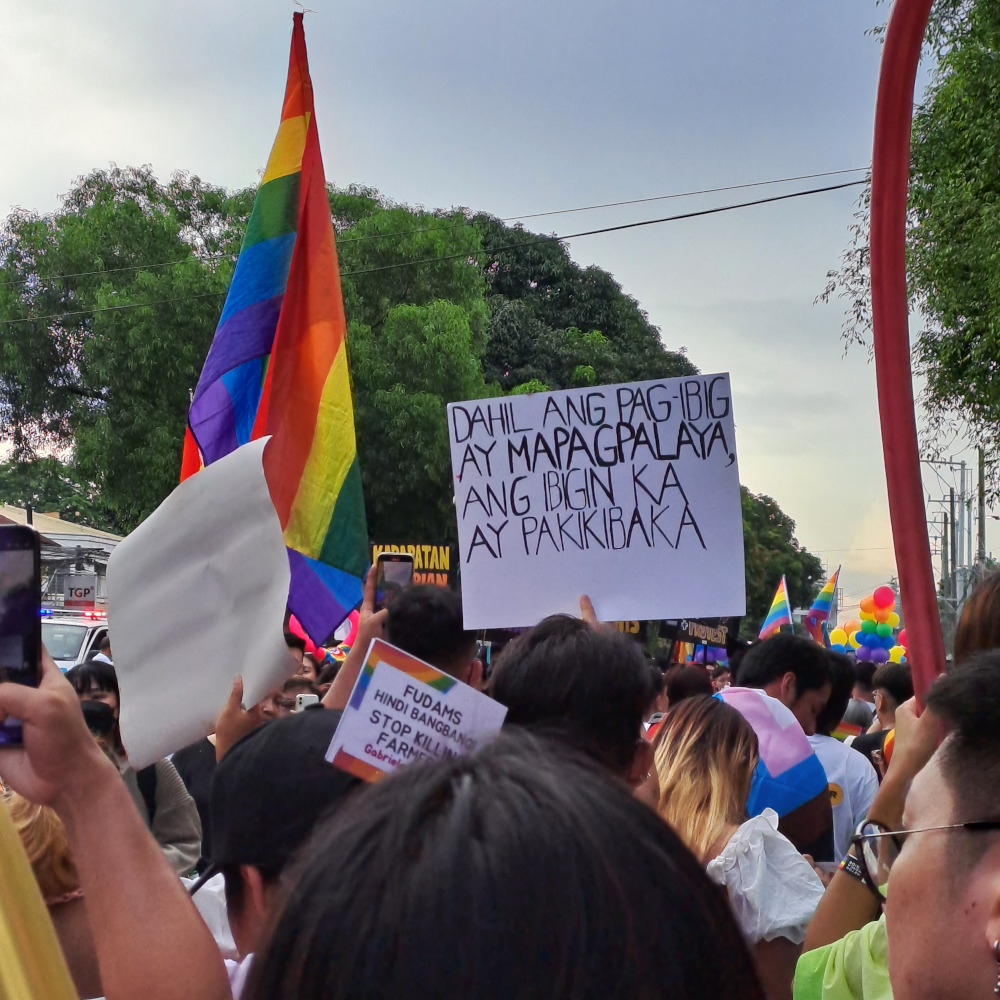
Before I begin to talk about my poetics, I want to put everything into context first.
The Fight of the Bakla
I went to this year’s Pride March with the goal of just taking pictures for this essay and going home immediately. The event was only a couple of minutes away from my apartment. One more thing that convinced me to go was the convenience. Pride Marches don’t really happen near me. In previous years, I had to commute to them. I accepted that my participation this year was only artifice, that I cared about appearances and nothing else. Walking alone to the march, I felt a certain singularity. I saw my body as timid and anticipatory. Okay, I felt self-conscious. As in the self makes itself known to the body. I arrived mid-march, stopping before the parade to spot an opportunity where I can blend in with the crowd. I saw companies sporting their T-shirts and their banners rolling by. I wasn’t really interested in joining companies trying to hit their DEI goals for the year, even though I shared some of their motivations for the day. Then, Bahaghari (Rainbow) Philippines, a national democratic, non-profit organisation that advocates for LGBTQ+ rights in the country came into view. No, their voices reached me first, loud and ringing and direction-full. I was invited to their cultural night the year before to read my poetry along with other writers and artists. I immediately joined them.

My body in motion, in utterance, pushed my self-conscious-ness outward. I am a solitary person most of the time. The inwardness as my cave. I am a Virgo and, in the tarot, the Hermit card represents me. But it felt nice being out, in every sense of the word. It was nice finding a place in that crowd. It was nice knowing that there is room for me in the struggle. My voice doesn’t carry that much weight. I’m soft-spoken and don’t know how to express my anger. In that crowd, the other people’s voices carried mine. Yes, I got my pictures but then it didn’t seem important to have them. Being in the crowd, doing what we do, stripped my assertion of artifice away. I shouldn’t separate myself from what we have to fight for.
The Philippines’s and Asia’s first pride march happened on 26 June 1994 and was inspired by the Stonewall uprising in 19691. Despite being the first in Asia, the Philippines is taking its sweet time in passing into law its anti-discrimination and harassment bill or the Sexual Orientation, Gender Identity, Gender Expression, or Sex Characteristics (SOGIESC) bill. It has been stuck in deliberation for 30 years with only this year’s house panel approval seeming to move it closer to legislation2. But confidence in lawmakers to pass the bill is low, especially with delaying tactics, stiff opposition from religious groups, and disinformation campaigns against it3.

Pride is a protest. That’s reiterated in this year’s Pride March with organisations giving updates on the next steps to attain our rights and with the protest chants, ‘SOGIE Equality, ipasa na!’ (Sogie equality, pass it now!), ‘Makibeki! Wag mashokot!’ The latter is a Swardspeak version of the slogan. Swardspeak or Gayspeak or Bekimon arose in the community, particularly with gay men, as a coded lexicon4. Makibeki comes from the word Makibaka which means to participate in the struggle. Beki is the Swardspeak for Bakla which means gay. Wag mashokot comes from huwag matakot which means don’t be afraid. Wag is the shortened version of huwag and mashokot is the Swardspeak of matakot. I know it’s a lot to take in but once you get it, you get it. In ‘Gay Language: Defying the Structural Limits of English Language in the Philippines’, Norberto Casabal posits that it is a form of verbal sublimation of gay people against the domineering power of patriarchy. The Filipino gay community began coining words that can be associated with the original word, either by its literal meaning or denotation, or by using other shades of meaning or connotation. It also includes the collocation of words through their phonological resonance and resemblance. There are many-many words in the Swardspeak vocabulary. One can even say a full sentence with them. Because of its rising popularity, almost everyone outside the LGBTQ+ community can understand it. Part of its appeal is that speaking it is fun. It’s like taking something plain and putting glitter all over it, creating something exorbitant, an ornamentation. What I like most about Swardspeak is its musicality, how the LGBTQ+ community’s inflection turns playful, that language is a vessel for laughter.
- See ‘The birth of pride’ by Poch Eulalia ↩
- See ‘House panel approves SOGIE equality bill’ by Gabriel Pabico Lalu ↩
- See ‘PRIDE and Prejudice: Lies Hound the Philippines’ Queer Anti-Discrimination Bill’ by Don Kevin Hapal ↩
- See ‘Anitch itich? Bekimon, or the secret code of gays’ by John Iremil Teodoro. Teodoro adds that bekimon provides a space for gays to talk about their lives without being understood by heterosexuals around them, many of whom are homophobic. Because of this, bekimon is quick to change or mutate. ↩













